#she's willful and knows her worth and won't diminish herself for anyone
Text
We Need a Hero. Ladybug Ain't It
In a July 2023 interview for the Guardian, creator of the Bechdel test, Alison Bechdel, bemoaned the toothless response from big media properties to demands for more complex female leads:
Is it dismaying that so many films continue to fail the test?
What’s really dismaying now is the way so many movies cynically try to take shortcuts and feature strong female characters – but they just have a veneer of strength and they’re still not fully developed characters.
I won't argue that Marinette/Ladybug isn't developed, but rather, that in Astruc's pursuit of a Strong Female Lead, we have a character whose strength, agency, wit, grief and elation, is most often at the expense of the cast around her.
We see this most clearly in her relationship with Adrien/Chat Noir. Here is a boy who is controlled, neglected, (arguably) abused, lied to, used, and weaponised by his sole guardian; his father. This has resulted in a sheltered and naive character who canonically has a desperately conditional understanding of love and loyalty. Most if not all of the displays of love Gabriel shows Adrien rest not on Adrien the person, but on Adrien the asset. His life is not his own, and as is revealed in very literal terms in Season 5, nor is his body.
The Gabriel and Adrien dynamic echoes through the Marinette and Adrien relationship. We are shown, explicitly in canon, that Marinette doesn't really know Adrien. He's a heartthrob and she understandably has a crush on him. But while in later seasons she casts aspersions at his army of adoring fans who go to any length to be close to him, she herself is clearly no better. Evidence says she's much worse actually. She takes astounding liberties with his day to day life, she lies to get closer to him, she polices his relationships with specifically other female characters, she delights in his sadness as seen in Glaciator 2:
Marinette: Oh, Adrien! Fancy seeing you here! And you look so sad, that's good!
Marinette as hero even abuses her position as Ladybug to break into his room, rifle around his things and even sniff his pillow. The show seems to make some attempt to explain away her behaviour in Derision by telling us that, in fact, Marinette does all this because she is the wounded party. Even if we accept for the moment that Derision wasn't a lazy retro-justification in service of Marinette's poor behaviour, her trauma does not trump Adrien's right to privacy.
Except, in-show, anything Marinette wants or needs trumps anything anyone else wants or needs, including Adrien–her ostensible partner. Adrien feels left out? Actually, this is more stress for Ladybug. Adrien dates Kagami? Actually this is competition for Marinette. Adrien is locked in a near-sensory deprivation chamber by his super villain father and feels forced to relinquish his miraculous? Actually this is bad news for Marinette.
If she's a hero, then she's one that comes with a price–one far beyond what I'm willing to accept as audience. I want a flawed hero. I don't want perfection. But equally, I don't want to be force fed the notion that this girl's dominant flaw is being a clutz. We get a few brief glimpses into the cost of her controlling behaviours but generally we suffer almost the entire cast telling us she is the Most Wonderful and Supreme Being That Has Ever Existed, all this while she consistently excels within the narrative through the diminishment of others. Need we remember her acing the gamer competition having never displayed a previous interest? How she surpasses even Joan of Arc in all matters miraculous?
Marinette the knight and Adrien the supposed Princess in the Tower: on paper the concept is a little tired but interesting, worth exploring. The role reversal that Astruc aimed for fell short though, and what we have instead is a role amplification. As I write, I struggle to think of a piece of media where the romantic interest has been quite so violated, lied to, limited and enfeebled.
Why did Bechdel's quote ring so true with how Marinette/Ladybug is drawn? That I feel cheated. That the potential for greatness was there, but instead we have a character who from a slightly different angle looks like a hero from wow-heroes-are-jerks juggernaut, The Boys.
I hope Season 6 interrogates Marinette's issues of control and denying agency more. I hope we see consequences beyond what is now a tedious series of panic attacks from Marinette when she's caught short. I hope real contrition and growth are modelled and that real, impactful, damaging character flaws aren't swept away by a cloud of narrative magical ladybugs.
54 notes
·
View notes
Note
Hi! I understand if you don't feel like sharing it ,but i really would like to read your meta about that Henry/Anne scene in BSR ''Isn't that enough?''. I hope you have a nice day.
"is it enough for you?" , but yes, i actually elaborated on this a little more elsewhere in other tags because i used that shot of that scene again for another edit.
so, expanding where i left off:
the images chosen are more the vibe for the quotes but the one from BSR is very specific
it's a great scene and it's so well-acted bcus she feels BAD for him here.
she pities him. she feels bad for him because he's losing her bcs she's not going to settle for these terms
because she knows she's amazing
and she's so self-posessed in the scene
and he cannot handle this and so it manifests in the reaction(you're making a big mistake; except that is his own big projection)
she's willful and knows her worth and won't diminish herself for anyone
...and i chose the reaction from the scene bcus it's not necessarily at odds with these descriptions (of her 'prudence')
bcs it takes a lot of dignity and self-worth and inward grace to stand one's ground enough (to withstand the 'tide of their prince')
...to give that rejection that by all social and cultural norms and graces she was simply not supposed to give. or was at least supposed to couch in more self-effacing terms.
but yeah anyway i know people thought BSR was 'trashy' but i actually thought the acting and chemistry between them was really great and maybe even lifted the writing from its weaker points.
because just the way he reels back at the line 'is it enough for you?' in all its pity-wrought glory...firstly, because it seems like it's a question no one has ever thought to ask him before, and secondly, so it gives way into that transformation from the shock into anger (how a 'lesser' person is daring to pity him, how he doesn't want her pity, he wants her love) which is just...chef's kiss. she absolutely obliterates his dignity here, not only in her rejection but in this eloquent explanation as to why this is her answer, and in the finality of her conviction. it is delicious. they could have this scene anywhere, in this darkened staircase for its the tudors copycat setting in this lithuanian palace, or on a fucking greenscreen, and it would still be just as powerful if these were its actors.
(im realizing that if anyone who is reading this hasn't watched they're going to think i'm an insane person based on this description... so hopefully the actual beats of the scene below will reveal what i mean, lol:
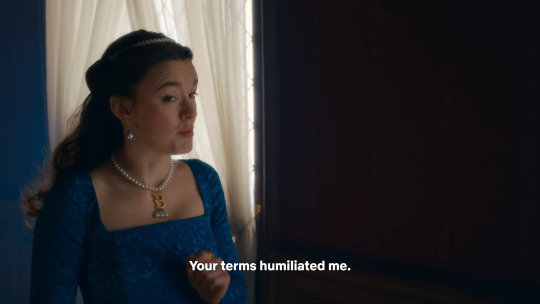
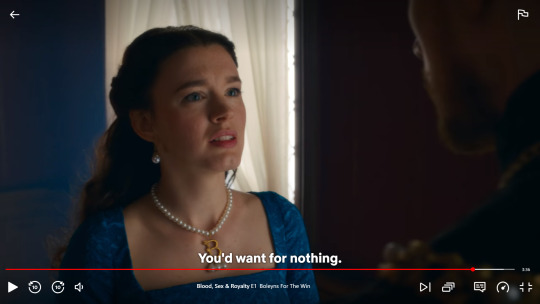
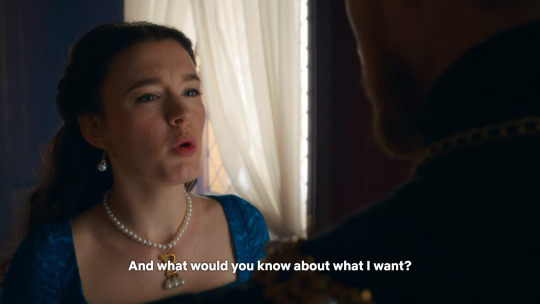

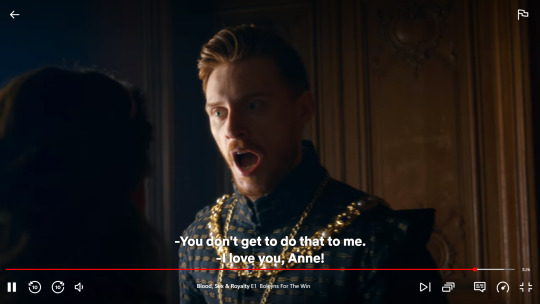
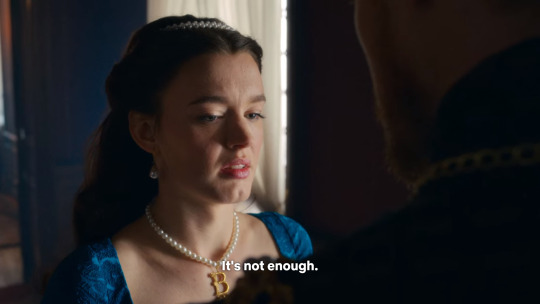
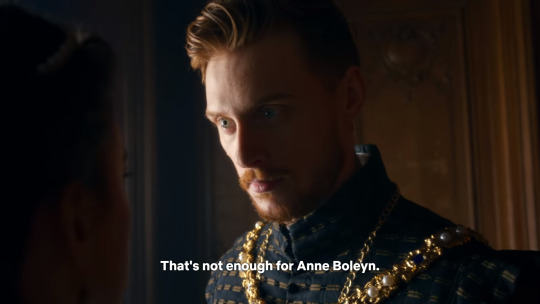

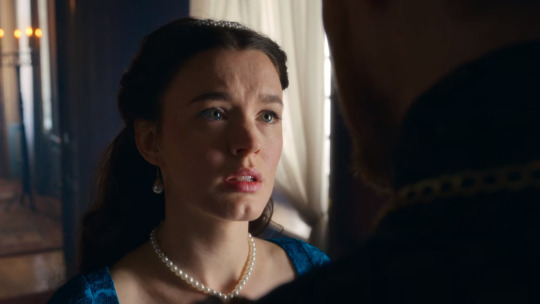
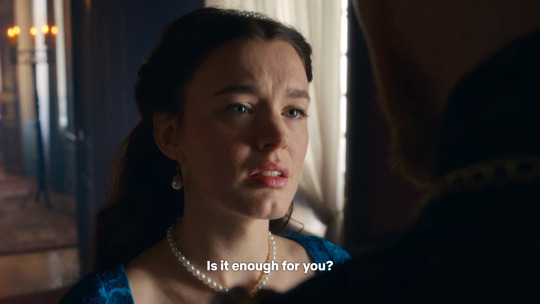
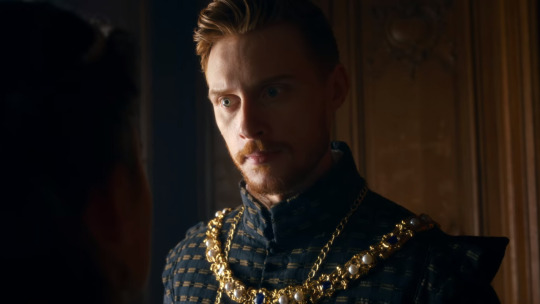


there's also a compelling subversion of (modern) expectation here, because...the only different thing in this equation is the status of the man asking to love her, asking why love is 'not enough'. for most 16c women of anne's status, no, 'love' wasn't enough. security was preferred. and, actually, it's very anachronistic how much this opinion is villianized (see, tobg:
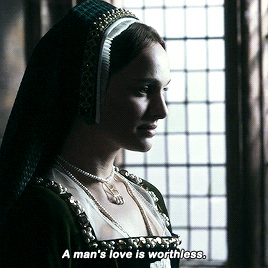
...when it's like...yeah, a man's love was considered worthless. if it wasn't, they wouldn't have considered betrothal contracts to be a necessary evil!). it's very easy for him to say that she would 'want for nothing' (households, jewels, etc, one assumes), and she isn't allowing his ease: she's contradicting him, and pointing out that there is little security in the position of royal mistress.
herein lies the constant counterfactual moralistic tutting: anne 'should've just become a mistress,' always paired with 'this would, in the end, have made her 'safer.'' and it would have, as we know (not anne), but it would also, as she points out here, likely lead into her being a nonentity (a voice on the pillow, a woman hiding underneath the sheets and behind the bed curtains, an ornament for dancing), and she didn't want to be one: she wanted to be partner and collaborator of her future husband, not the diversion and darling of someone else's.
tl;dr the scene is powerful because she feels bad for him (she feels bad for herself, too, but she only allows him to see the former:


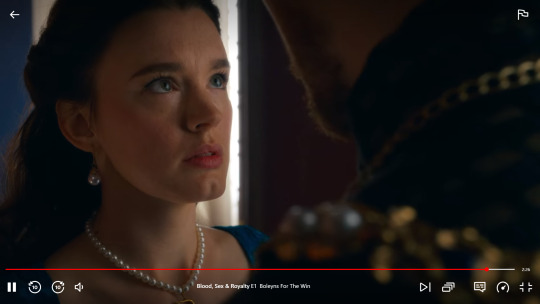

#redrosesandcharmingsouls#something about him essentially shouting at the top of his lungs 'WHAT'S SO 'HUMILIATING' ABOUT LOVE'#as he humiliates himself. for love. and so tries to leave with the final word.#and then still comes bounding back (by implication. the next MORNING?? ) like a fucking boomerang#all like step 1: failed.#and her asking why he would ask for something which diminishes them. why would he only want half a life with her?#doesn't he want more? it's a challenge but she's not expecting him to take it literally#she's asking why did you ask that of me? do you want me to think less of you?#do you think so little of me? do you think so little of yourself? don't you want more for yourself?#and it's the perfectly written question for these two people. from her to him#bcus they're both alike in that way. they both always want more for themselves#they are both always seekers#so yeah as much as i guess im alone in this opinion#i think this series did a really great job of like...establishing their point of connection#she's a challenge and he's a challenger.
7 notes
·
View notes